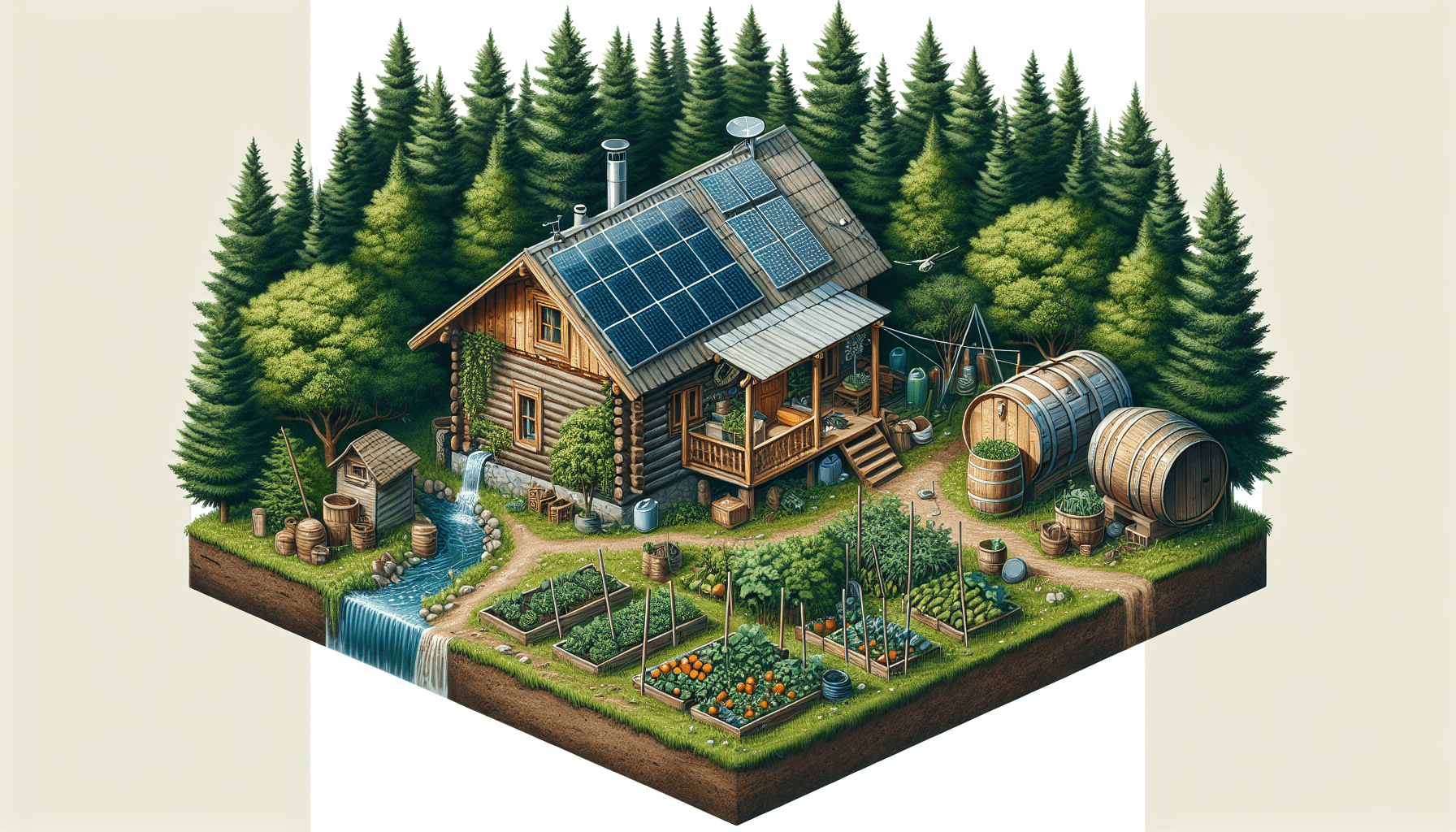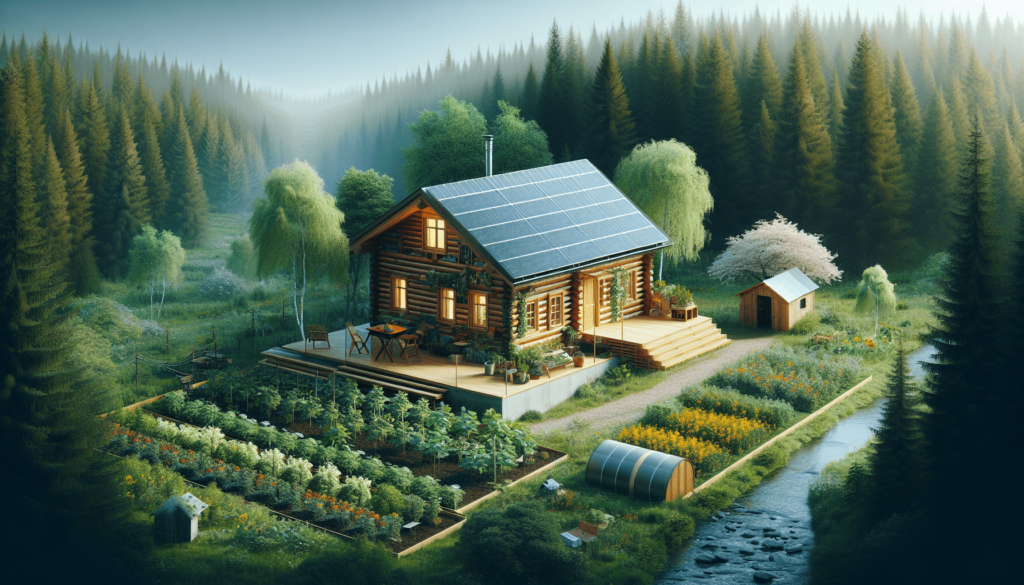
Welcome to an exploration of the states where living off-grid might land you in hot water. In “In What States Is It Illegal To Live Off-grid?” you’ll discover the intricacies of off-grid living regulations across the United States. This article provides a friendly and informative guide to help you understand which states have restrictions on off-grid living and what those regulations entail. You’ll gain valuable insights into how state laws can impact your sustainable lifestyle and what you need to know if you’re dreaming of a self-sufficient existence. Have you ever dreamed of living off the grid? The idea of self-sufficiency, independence, and a closer connection to nature can be alluring. However, while this lifestyle can be deeply rewarding, it’s essential to know the legalities in your particular state before making the leap.
In What States Is It Illegal To Live Off-grid?
Understanding the legal landscape is crucial if you plan to transition to an off-grid lifestyle. While it’s technically not illegal to live off-grid in any state, numerous regulations and restrictions can make it challenging to do so freely. Some states are more restrictive than others, and local zoning laws also play a significant role.
States with the Most Restrictions
Different states have varied regulations when it comes to living off the grid. In some places, water rights, building codes, and other regulations can complicate your journey to self-sufficiency.
| State | Restrictions |
|---|---|
| California | Stringent building codes, water rights |
| Colorado | Complicated water rights |
| Florida | Strict building codes for alternative structures |
| New York | Zoning and permit issues in rural areas |
| Hawaii | Water catchment and zoning regulations |
California
California is known for its tough building codes and water rights regulations. Living off-grid here can be a challenge, primarily because of water laws. The state’s building codes usually require that you have a certain square footage, plumbing, and electricity, all of which can be hard to adhere to when living off-grid.
Colorado
In Colorado, water rights are incredibly complex. It’s interesting to note that you often can’t legally collect rainwater, which can pose a significant problem for off-grid living. Water is a primary concern in this state, and you will need to navigate these regulations carefully.
Florida
Florida has specific building codes that can make it tough to live off-grid. For instance, many counties in Florida have regulations that require your home to be tied to the electrical grid. The state also has rules about waste disposal, which can add another layer of complexity to living an off-grid lifestyle.
New York
New York State, especially in rural areas, has zoning laws and building codes that can make an off-grid lifestyle difficult. You will likely need various permits to make alterations to your property or to build new structures. Even in more remote areas, local codes can dictate how and where you can live off the grid.
Hawaii
Hawaii has unique regulations regarding water catchment systems and zoning laws. Since drinking water can be scarce, the state has strict guidelines on how you can collect and use rainwater. Zoning regulations can also limit your ability to live off the grid freely.
States Where It’s Easier To Live Off-grid
On the other end of the spectrum, some states have fewer restrictions, making it easier for you to adopt an off-grid lifestyle. These states are more lenient with their building codes and water rights, giving you more freedom to sustain yourself.
| State | Reasons |
|---|---|
| Texas | Minimal building codes, lenient off-grid regulations |
| Tennessee | Fewer zoning regulations, easier to obtain permits |
| Missouri | Lenient building codes, easy utility regulations |
| Michigan | Permissive building codes for rural areas |
| Vermont | Supportive of sustainable living practices |
Texas
Texas is one state where living off the grid is generally more accessible. The state has minimal building codes, and there are fewer restrictions on collecting and using rainwater. Moreover, Texas tends to have flexible utility regulations, allowing you to operate off-grid more seamlessly.
Tennessee
Tennessee offers a more lenient regulatory environment for those wishing to live off-grid. There are not as many stringent building codes, and zoning regulations are more relaxed. This leniency often makes it easier to obtain the necessary permits to live self-sufficiently.
Missouri
In Missouri, building codes are quite lenient, and utility regulations are not as strict as in other states. This makes it easier for you to live off the grid while building the types of structures you desire, like tiny homes or solar-paneled cabins.
Michigan
Michigan offers permissive building codes, especially in its rural areas. This allows you to design and construct off-grid homes without facing many bureaucratic hurdles. The state also has fewer restrictions on alternative energy sources.
Vermont
Vermont is known for its supportive stance toward sustainable living practices. Its laws are more flexible regarding building codes and how you can generate and use renewable energy. This makes it an ideal state for those interested in an off-grid lifestyle focused on sustainability.
Key Considerations For Going Off-grid
Before making any moves, several key considerations must be kept in mind. Knowing what lies ahead can help you make informed decisions and avoid potential legal pitfalls.
Water Rights
Water is an essential resource, and different states have varying regulations on how you can collect, use, and dispose of it. Some states allow rainwater collection without any issues, while others have stringent rules.
Building Codes
Building codes in various states can dictate everything from the size of your dwelling to how it gets its power. Adhering to these codes can sometimes mean needing to connect to the grid or follow specific guidelines that may not align with your vision of off-grid living.
Zoning Laws
Zoning laws impact where you can live and what you can build on your property. Some zones may be restricted to single-family homes with traditional utilities, while others might be more flexible, allowing for more innovative off-grid solutions.
Waste Disposal
Proper waste disposal is another crucial aspect. Depending on the state’s regulations, you may need to connect to a municipal sewer system or adhere to strict guidelines for septic systems. Composting toilets and other eco-friendly waste disposal methods may also be regulated.

Navigating Legalities
Understanding and navigating the legal requirements is critical to successful off-grid living. Here’s how you can make the process more manageable.
Research Thoroughly
Before purchasing land or starting to build, thoroughly investigate the local and state regulations. Websites, local county offices, and state resources can offer valuable information that could save you a lot of time and money.
Consult Legal Experts
Consulting a legal expert specializing in land use and property law can provide invaluable insight. Legal advisors can help you understand the intricate aspects of water rights, building codes, and zoning laws applicable to your situation.
Plan for Permits
Many off-grid projects will require various permits. Whether it’s for building a new structure, installing a solar panel system, or setting up water collection, knowing what permits you need ahead of time can streamline your journey to going off-grid.
Engage with Local Communities
Engaging with local communities who have experience with off-grid living can provide practical advice and support. They can offer insights into navigating local regulations and share experiences that can help you avoid common pitfalls.
Financial Considerations
Living off-grid can also have financial ramifications. Understanding these aspects can help you budget and plan more effectively.
Initial Costs
The initial costs of setting up an off-grid lifestyle can be substantial. Purchasing land, installing solar panels, building structures, and setting up waste disposal systems are all significant investments.
Maintenance Costs
Once you’re up and running, ongoing maintenance costs need to be considered. Solar systems need periodic checks, water systems require regular maintenance, and waste management frameworks also need attention.
Property Taxes
Property taxes will still need to be paid, and these can vary significantly based on the location and size of your property. Understanding the local tax laws can help you budget more effectively.
Self-sufficiency Expenses
Off-grid living often means you’ll be producing your own food, collecting your water, and generating your energy. Each of these elements has its own set of costs, from seeds and livestock to solar batteries and rainwater collection systems.

Benefits of Living Off-grid
Despite the potential legal and financial challenges, living off-grid comes with numerous benefits that make it an attractive option for many.
Environmental Impact
Living off-grid often results in a smaller environmental footprint. Using renewable energy resources, recycling waste, and sustainable living practices contribute positively to the environment.
Independence
One of the most significant benefits is the sense of independence that comes with off-grid living. You are less reliant on public utilities and systems, which can offer a greater sense of freedom and security.
Cost Savings
While the initial setup can be costly, living off-grid can lead to long-term savings. Utility bills are non-existent, and growing your own food can cut down on grocery expenses.
Health Benefits
A closer connection to nature and a more active lifestyle can lead to numerous health benefits, including better mental health, improved physical fitness, and overall well-being.
Challenges of Living Off-grid
Like any significant lifestyle change, living off-grid also comes with its own set of challenges.
Isolation
Off-grid living often means living in more remote areas, which can lead to feelings of isolation. It’s essential to consider how you will maintain social connections and access to community resources.
Physical Demands
Maintaining an off-grid home can be physically demanding. From chopping wood to maintaining systems and growing food, it’s a lifestyle that requires a strong commitment to physical labor.
Learning Curve
There’s a steep learning curve when it comes to understanding how to maintain self-sufficiency. Whether it’s learning to manage renewable energy sources or effectively growing your own food, there’s a lot to learn.
Financial Pressure
While long-term savings are possible, the initial financial outlay can be significant. You’ll also need a contingency fund for unexpected expenses or emergencies.
Conclusion
Living off-grid presents an enticing option for those looking to gain independence, reduce their environmental footprint, and live a more self-sufficient lifestyle. However, navigating the legal landscape is crucial. Understanding the various state and local regulations regarding water rights, building codes, zoning laws, and waste disposal can make or break your off-grid dream.
States like Texas, Tennessee, Missouri, Michigan, and Vermont offer more lenient regulations, making it easier to transition to an off-grid lifestyle. Conversely, states like California, Colorado, Florida, New York, and Hawaii have more restrictive regulations.
By thoroughly researching, consulting legal experts, planning permits, and engaging with local communities, you can navigate these complexities effectively. Financial planning and understanding the key challenges can also prepare you for a smoother transition.
While living off-grid is not without its challenges, the benefits of environmental sustainability, independence, cost savings, and health improvements often outweigh these obstacles. With careful planning and preparation, you can successfully embrace the off-grid lifestyle of your dreams.
